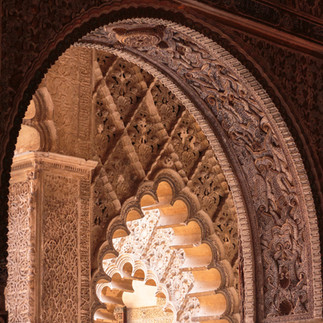Fantasy Prologue: "The Dragon Diaries"
- Caroline Hamar

- Jun 25, 2024
- 4 min read
Updated: Jan 20, 2025
I was there, when the world ended in fire. They say that Baseeta crumbled and collapsed but I remember it as a slow trickle, of blood black with ash, as if the night sky was crying.
- Excerpt from the column 'The Black Rivers' by Abbas Habib
In the Aswad mountains there was a town nestled under the shadow of a volcano which had been dormant for centuries. The town was called Baseeta. It was an Arabic word which has no English translation. The closest would be the phrase: “I will unleash my revenge on you, when you least expect it.”
It seemed fitting for a town at the base of a volcano. But as the last few remaining humans of today know, that the threat of revenge did not come from that fiery entity.
Our story starts in the year 19,000 on the planet Sahara. The town of Baseeta had been abandoned for 90 years.
But one fateful night, a girl slipped into the night market. A night market in tatters; a forgotten heritage on the first tier of the town, the stalls were now half buried in sand with oil lamps smashed and scattered like beetles. The hot summer breeze had brought down a fresh covering and it softened every step. Barefoot was the best way to travel through Baseeta, Djamila had been told to take slow, soft steps as to not wake anything below.
The black slate volcano towered over her like a cloaked figure hunched over a cauldron, slowly stirring.
Djamila made her way up the steep, winding streets and into the heart of the town. Finally, she thought, finally she was in the ghost town she had read so much about. She could still smell the hot sun in the stone as the town took it’s first breath of relief in the night air.
On the highest tier was The Tamer Residence, carved into the side of the mountain. The four stories of balconies were crumbling and the zellijs were peeling but it towered over the alleyway like a goddess comforting a rat in the street.
She walked through the archway.
There was not a sound. What once was an array of walled gardens and mosaic fountains was now paralysed under the blanket of night and also ever moving under the touch of time - decay is it's own eternity.
There was a back door and painted on it was a hand holding upright a red rose and from the rose golden rays were painted.
Night 23
A ruptured rose
grew from desert sand
with no drop of water
just the touch of a hand.
And she bared her teeth
ready for the sun
“I’ll swallow you whole and glow just the same”
is the song she sung.
A feeling swelled within Djamila, it was all starting to make sense. Not in the correct order - Hazif had written a poem for each night he was here and she was starting with the one on the 23rd night. Was this a symbol, for someone? For a meeting place? The paint of the rose soaked into the wood, like sun spots on skin.
She pushed open the door and slipped into the darkness within.
There weren’t always dragons in the cavern, that’s what we say out at the edge of the world, where the desert sands meet a crystal blue sea. We are refugees, existing in a line of shacks on the shore with fabric awnings billowing in the wind. We tell everyone, "there weren’t always dragons in the cavern". People call us piteous in our attempt to cling to a history wiped out by fire. The cavern we speak of is deep in-land. It’s where the black basalt crumbles into a monstrous pit at the edge of the Aswad mountains. It was true, the dragons had been gone for 500 years. But, the dragons would say, it doesn’t matter how long we were gone for, we were here long before you.
- An excerpt from ‘A Baptism of Fire: The Dragon-Age ’ by Guda Badawi.
The Tamer Residence had heavy air, it might have been the dark or it might have been her fear but Djamila felt it resting on her. It was dark, silent and still. It was a building trying too hard to pretend it didn't exist. She made her way through the shadows, her bare feet slid onto the cold tiled floors - from sand to ceramic - it was a boundary crossed.
There had been an advert posted in the local newspaper in the northern city of Albooma. An advert for a Death Collector, that was the name for someone who helped to organise and clear someone's personal belongings after they had died. Everyone thought it was a joke - an advert for a Death Collector in a town where everyone was dead, and had been dead for 90 years. But Djamila recognised the name on the advert... Hazif, the once infamous, but then quickly and unexplainably removed, poet.
By Caroline Hamar
After achieving a degree in English Literature and a diploma from The London school of Journalism, Caroline likes every kind of writing from short stories, poetry, articles and essays.
Caroline welcomes your comments below...









Comments